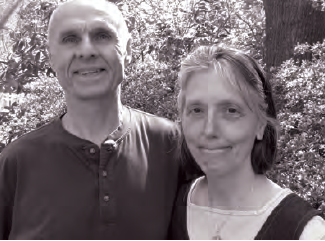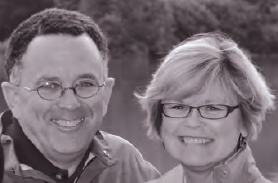 In HSCI’s second annual report produced in 2006, we thanked all of our donors for the tremendous generosity and vision that were critical to the launching of the Institute. Six years later, our donors continue to inspire us with their support and enable us to move forward with the vision of bringing cutting-edge stem cell research to clinical applications to cure or better treat diseases like cancer, Parkinson’s disease, diabetes, and kidney and heart disorders.
In HSCI’s second annual report produced in 2006, we thanked all of our donors for the tremendous generosity and vision that were critical to the launching of the Institute. Six years later, our donors continue to inspire us with their support and enable us to move forward with the vision of bringing cutting-edge stem cell research to clinical applications to cure or better treat diseases like cancer, Parkinson’s disease, diabetes, and kidney and heart disorders.
Back in 2006, Susan and John Tavela told us about their chief connections with our mission.
“It’s about family,” Sue said. “My husband’s mother died of Alzheimer’s. And of course, there’s Leslie.”
Leslie is the Tavelas’ daughter-in-law, who suffers from type 1 diabetes.
“We want Leslie to be able to have a long life and watch her two children grow up. Supporting stem cell research is the best way to do that,” Sue said.
After reading an article in the Boston Globe about Douglas Melton, PhD, they sought out HSCI to make a donation. They have made monthly gifts to the Institute ever since, even writing notes recently letting us know that they moved to a different part of the country to be closer to family so that we could make sure to maintain our connection.
As attendees of some HSCI events like our annual symposium, the Tavelas had high praise for the HSCI investigators they met, such as Lee Rubin, PhD. After hearing faculty talk about their work and the moral issues they deal with, Sue reported she felt that HSCI “seems like one of the most ethical organizations I could support.” The Tavelas are firm believers that the reason for stem cell research is to enhance human life. According to Sue and John, “If people knew as much about stem cell research as we do, everyone would support it in whatever way they could.”
Much like the Tavelas, Agnes and Alfred Cavalari have been monthly donors to HSCI for the better part of HSCI’s existence. In a recent conversation, Agnes reported that they started giving to HSCI because of their focus on degenerative disease.
“The quest for a cure, whenever that may be realized is key,” Agnes said.
When asked why she chose to give on such a frequent basis, Agnes indicated that the reason was simple.
“When you have people you know living with these medical issues every day, it makes sitting down each month and writing a check a natural thing to do.”
 Stephen and Jo Ellen Brewton have been donating to HSCI since its founding. One of the reasons is because Jo was diagnosed with type 1 diabetes as a child and they hope we will be able to find a cure for it and other diseases.
Stephen and Jo Ellen Brewton have been donating to HSCI since its founding. One of the reasons is because Jo was diagnosed with type 1 diabetes as a child and they hope we will be able to find a cure for it and other diseases.
Jo and Steve also give as a result of political concerns and personal convictions about the role of governmental and institutional politics in aiding or hindering stem cell research. They first heard about Melton’s research on T1D and the story of his personal connection with the disease while listening to NPR shortly after the turn of the millennium. A few days after President George W. Bush’s re-election in 2004, the Brewtons “decided to jump on a plane to Boston and deliver a check to Doug Melton” as a way of making a personal difference regarding and a statement about the continuation of the President’s restrictions on federally funded human embryonic stem cell research.
“We’re supporting the true core, cutting-edge diabetes research. We view HSCI as a ‘true north’ in terms of your motives and mission. And we hear and understand the critical value of collaboration to this work, which lets HSCI researchers share information and cell lines to get the work accomplished more quickly.”
All three donor families we talked to mentioned hope as a key element in their desire to support the work at HSCI. Continuous and regular donations such as these inspire a similar hope among the researchers here who are trying to achieve the best possible outcomes in the best possible way. On behalf of all of them, thank you for your continued commitment to our mission.
